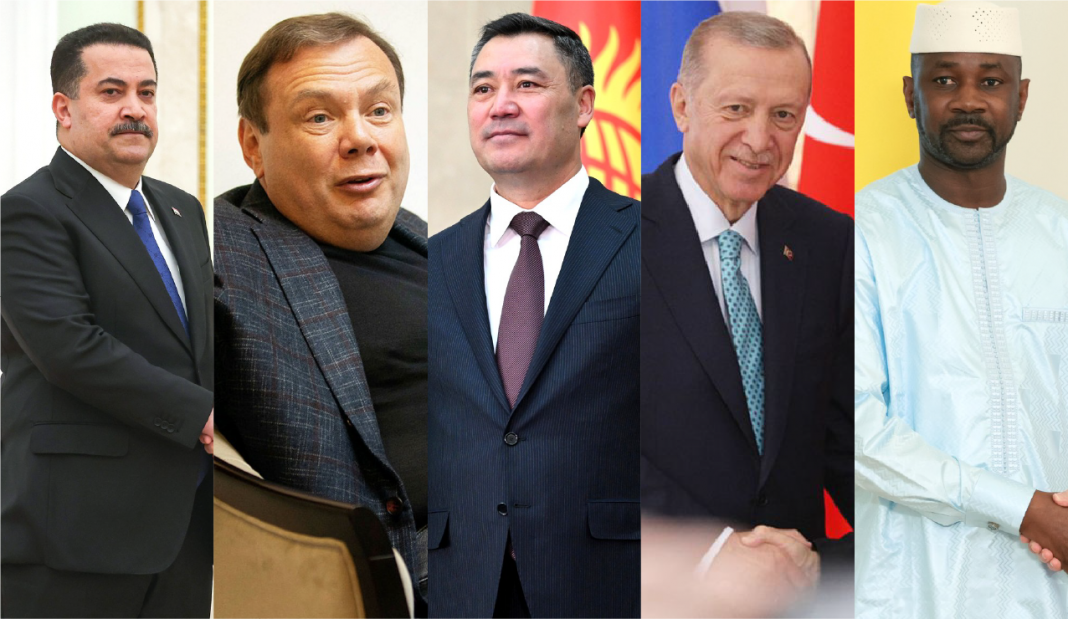This report describes the key events that significantly impacted Russia’s political, economic and social processes.
Based on the results of the past week, the following trends can be summarised:
- Last week, Putin used a thesis about Ukraine several times that differs markedly from previous statements. The Russian president is increasingly emphasising that, from his point of view, the war in Ukraine began in 2014 with an alleged coup d’etat carried out with the support of the United States. In this way, he is trying to appeal to the fact that Russia is supposedly ending the war and not starting it. Most likely, such rhetoric is part of preparations for a visit to China and discussing this issue with Xi Jinping.
- For Russia, the most pressing topic remains the development of the energy industry and consolidation of its positions in the international arena. Therefore, the number of Putin’s contacts with Central Asia and the Middle East leaders has recently increased significantly. Russia will continue to work in this direction. Currently, Europe is demonstrating that it can cope without Russia (gas storage facilities pumped to record levels on the eve of winter is one such proof). Still, we should expect an intensification of the Russian information campaign aimed against Europe and the West shortly.
- In his new interview for a Chinese audience, Putin focuses on Chinese-Russian relations and clarifies that left-wing ideas are not alien to him. He draws attention to several problematic issues (including those regarding Ukraine) and presents them in the interpretation in which he would like to find support from China. In particular, it is felt that in matters of the war in Ukraine, Putin would like to count on the mediation of Xi Jinping, who is meeting with Joe Biden in early November in San Francisco.
This digest highlights the following topics that were most relevant for Russia during 09th – 15th of October:
1. Meeting of Vladimir Putin with Prime Minister of Iraq Mohammed Sudani;
2. Telephone conversation between Vladimir Putin and the president of the transition period of Mali, Assimi Goita;
3. Telephone conversation between Vladimir Putin and Turkish President Recep Tayyip Erdogan;
4. Plenary session of the international forum “Russian Energy Week”;
5. Vladimir Putin’s visit to Kyrgyzstan and negotiations with President Sadyr Japarov;
6. Meeting of the Council of Heads of State – Members of the CIS;
7. Return of Mikhail Fridman to Russia;
8. Visit of Nikolai Patrushev to Azerbaijan;
9. Interview with Deputy Secretary of the Security Council of the Russian Federation Oleg Khramov to Rossiyskaya Gazeta.
10. Vladimir Putin’s interview with the Chinese media corporation
This Content Is Only For Subscribers
- Meeting of Vladimir Putin with Prime Minister of Iraq Mohammed Sudani
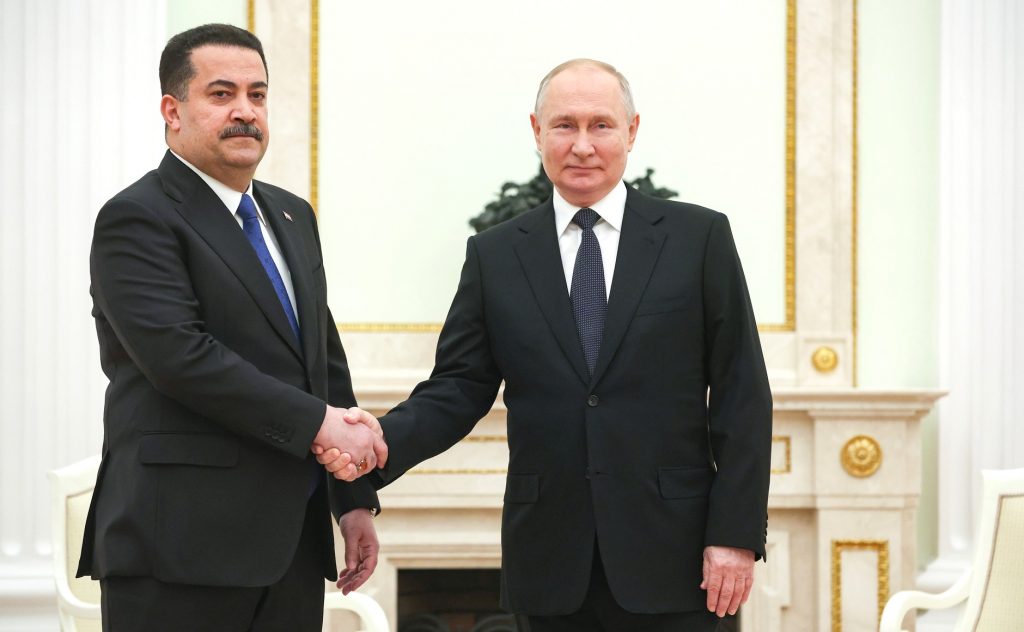
On Tuesday, October 10, Vladimir Putin met in the Kremlin with the Prime Minister of the Republic of Iraq, Mohammed Sudani, who is in Russia on an official visit. During the meeting, the parties discussed economic relations and prospects for further development of interactions in the energy sector.
Key theses:
- Putin: “Of course, the main area of our interaction is energy. Our largest companies operate in your country and are very successful. The total investment of our companies amounted to approximately $19 billion, and there are prospects for further development of our interaction; it is very effective in this area. We coordinate work within the framework of OPEC Plus and do this very successfully to stabilise the situation in world markets. Overall, we succeeded in this, and I hope we will continue working with you.”
- Putin: “Of course, your visit to Russia is taking place against the backdrop of crises: the Ukrainian crisis continues, and, unfortunately, we see a sharp aggravation of the situation in the Middle East. I think that many will agree with me that this is a clear example of the failure of the policy of the United States in the Middle East, which tried to monopolise the settlement but, unfortunately, was not concerned with finding compromises acceptable to both sides, but, on the contrary, putting forward their ideas about how this should be done put pressure on both sides—namely, both: first one, then the other.”
- Sudani: “Russia is a friendly country with which we have deep, historical relations. “I would like to renew Iraq’s gratitude to Russia for its support during the fight against terrorism, the war against terrorism, for providing us with weapons and weapons so that we could resist armed terrorist groups.”
- Sudani: “We have a good foundation; there are Russian companies that work, particularly in the oil and gas sector. Our countries play an important role in the oil market; therefore, we need to continue bilateral coordination within the OPEC plus format.”
- Sudani: “There are complex and dangerous developments in Palestine right now. It is a natural result that Israel has continued to commit violations against the rights of Palestinians, and the international community has remained silent and has failed to live up to its obligations under internationally recognised resolutions. We are now witnessing another intifada, an uprising of Palestinians demanding an end to these violations of their rights.”
- Sudani: “Of course, today, Iraq, through its policy, is trying to maintain stability in all regions, including about the Ukrainian crisis. We have suffered greatly from blockades from war, and, of course, our position is firm: we support the search for peaceful solutions through dialogue to end conflicts that have very negative consequences at the humanitarian and economic levels.”
Outcomes and outlook:
In the context of the aggravation of the situation in the Middle East, the Russian Federation is holding a series of consultations with the leaders of the Arab world regarding their positioning in the new reality. Iraq is a long-time partner of the Russian Federation (Russia has several energy interests, especially related to oil production).
Iraq is the most important influence on the Arab world and the Middle East. Russia would like to become a mediator in bringing together the positions of the Arab world and Shiite Iran. In this context, the conversation between Putin and Sudani is critical. Iraq is also an essential element in influencing the situation in the global oil market (Iraq’s position will be considered when considering the issue of increasing oil production next year). However, now the forecasts of American analysts are disappointing: in 2024, an increase in oil prices is predicted at 15%. In fact, against the backdrop of a gradual search for new points of contact between Saudi Arabia and the United States and strengthening relations with Iraq, Russia is trying to diversify risks.
- Telephone conversation between Vladimir Putin and the president of the transition period of Mali, Assimi Goita
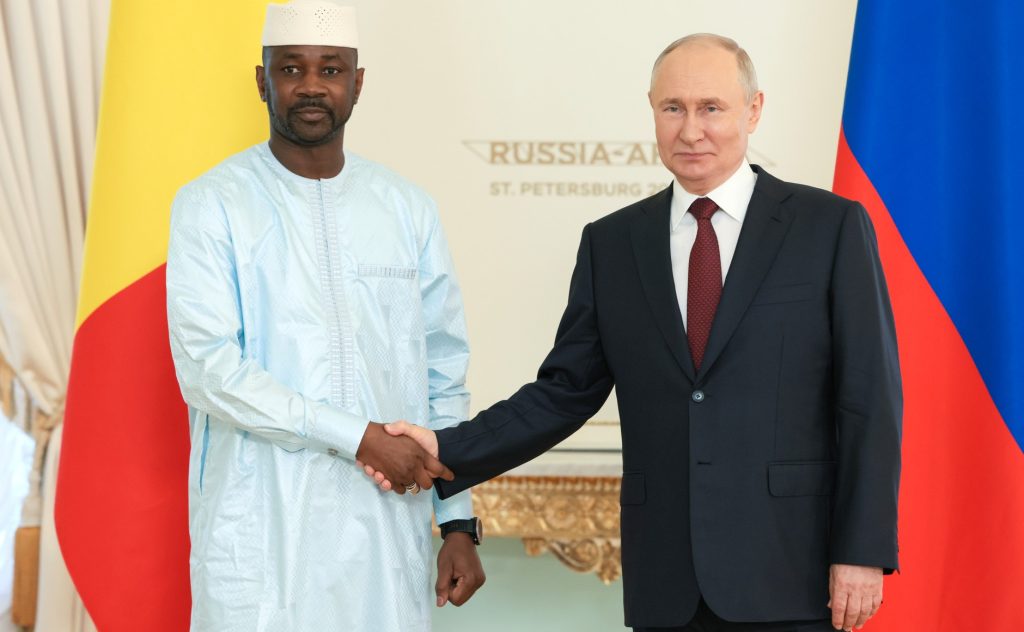
On Tuesday, October 10, at the initiative of the Malian side, Vladimir Putin had a telephone conversation with the President of the transition period of Mali, Assimi Goita. According to official statements, during the discussion, questions were raised about the progress in implementing the agreements reached at the negotiations between Putin and Goyta at the second Russia-Africa summit in July 2023. A plan to further strengthen trade and economic ties, cooperation in security issues and the fight against terrorism was also confirmed. The Malian side expressed gratitude for the diverse assistance provided by Russia. The parties also note that they discussed the general situation in the Sahara-Sahel region.
Outcomes and outlook:
This telephone conversation shows that the African direction is one of the most important in the foreign policy of the Russian Federation. In current conditions, Mali is one of Russia’s outposts in Africa and a centre of influence over the entire Sahara-Sahel region. It is quite possible that shortly, we will see a strengthening of the Russian presence in Mali and neighbouring countries through the transfer of new PMCs and assistance to regime-controlled weapons and military advisers. In this context, it is essential to recall Putin’s meeting with Yunus-Bek Yevkurov and Andrei Troshev, which Ascolta wrote about in previous digests.
It is also possible that in other states of the Sahara-Sahel region, we should expect social upheavals and potential changes in ruling regimes.
- Telephone conversation between Vladimir Putin and Turkish President Recep Tayyip Erdogan
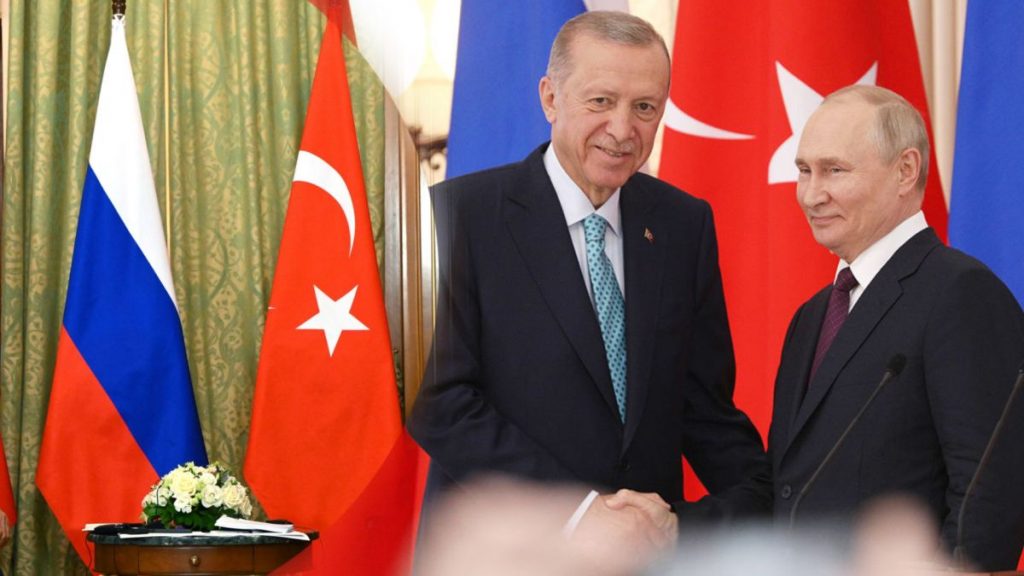
On Tuesday, October 10, at the initiative of the Russian side, Vladimir Putin had a telephone conversation with the President of Turkiye, Recep Tayyip Erdogan. According to the parties’ statements, the conversation’s main topic was the sharp deterioration of the situation in the zone of the Palestinian-Israeli conflict. The parties noted their commitment to resuming the negotiation process and also expressed mutual readiness to promote a peaceful resolution of the conflict.
The leaders of Russia and Turkiye also stated that a long-term peaceful settlement of the Middle East crisis is possible solely based on a “two-state” formula approved by the UN Security Council, which provides for the creation of an independent Palestinian state within the 1967 borders with its capital in East Jerusalem.
Outcomes and outlook:
Turkiye will play a vital role in resolving the conflict in the Middle East. Turkiye has both the resources and a system of influence for this. And it is Erdogan, not Putin or Biden, who can become a real peacemaker in the flaring-up conflict. Considering this point and the role of Turkish diplomacy in the situation around the South Caucasus, telephone conversations between Putin and Erdogan are extremely important.
In addition, the call to the Turkish leader took place just before Putin visited China: given the role of the People’s Republic of China in the Eurasian region, Moscow and Ankara usually coordinate issues related to relations with Beijing.
- Plenary session of the international forum “Russian Energy Week”
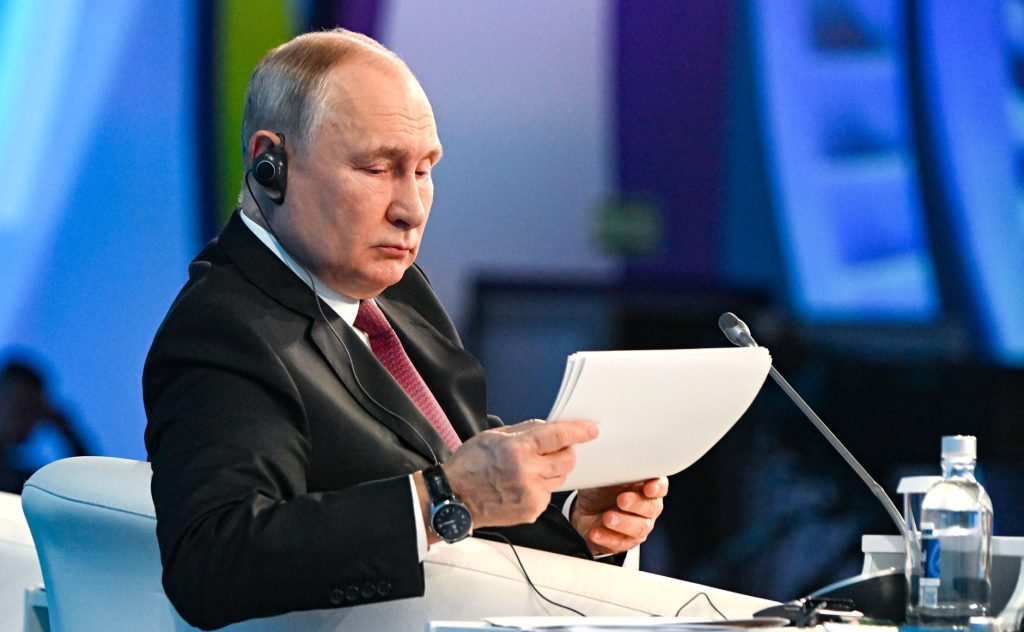
On Wednesday, October 11, Vladimir Putin took part in the plenary session of the international forum “Russian Energy Week”, which was held in Moscow for the sixth time and took place from October 11 to 13. The forum’s main topic was “The New Reality of Global Energy: Creating the Future.” Its participants included representatives of governments of various countries, heads of major energy companies and organisations, scientists and experts. The organisers claim the participation of over four thousand people from more than 60 countries.
Also taking part in the forum’s plenary session was the Prime Minister of the Republic of Iraq, Mohammed Sudani, who was in Moscow on a working visit.
Key theses:
- Putin: “Our basic priority is to ensure the national market, a sufficient fuel and energy resources supply within the country. Moreover, I would like to emphasise that this is not only about the current needs of businesses and citizens – we will consistently work on the qualitative development of our market and increasing its capacity. The opportunity here is definitely huge.”
- Putin: “It is planned to unite the gas transmission systems of the West and East of Russia. In the first stage, we will connect the Power of Siberia and Sakhalin – Khabarovsk – Vladivostok gas pipelines, and then we will include them in a unified gas supply system. The construction of the Power of Siberia – 2 system will allow gas to be supplied to many regions of Siberia and the Far East of the country.”
- Putin: “The second strategic, systemic task of the Russian fuel and energy complex is the creation of maximum added value, the development of deep oil and gas processing. We have already made significant progress in this area. Large-scale oil and gas chemical projects have been developed and are being implemented, including those with state participation and state support.”
- Putin: “In this regard, the third direction of structural transformation of the fuel and energy complex. We are talking about the formation of complete sovereignty of the industry: technological, personnel and financial. It is necessary to radically increase the volume and share of production of Russian equipment, especially critically important ones, to bring the training of qualified personnel to a new level and, of course, to form our mechanisms for financing investment projects.”
- Putin: “The Russian engineering school for constructing and maintaining nuclear power facilities is not only strong but has virtually no competitors at the global level. At the same time, I want to emphasise this: Rosatom specialists are simultaneously building 22 power units abroad. This is approximately 80 per cent of the global market.”
- Putin: “In Russia, new areas of nuclear generation are being developed, for example, low-power nuclear power plants in land-based and floating versions. The first floating station, “Akademik Lomonosov”, has operated since 2020 in Chukotka. Shortly, four more similar power units will be deployed here. Russia’s first low-power land-based nuclear power plant is being built in Yakutia.”
- Putin: “With the participation of RusHydro, more than 350 facilities were designed and built in 54 countries. Today, the company supplies its technological solutions to 17 countries, including countries in Africa, the Middle East, Central Asia, and Latin America, increases technology transfer and provides engineering for the entire period of operation of the stations, which is 50–70 years.”
- Putin: “And in this regard, the fourth direction of transforming our fuel and energy complex. It is directly related to new prospects and export geography. As you know, European countries have abandoned our energy resources – not completely, but they are trying to do so – which have ensured the economic and social well-being of the European Union for many years. For now, I will leave aside the effect of these decisions on the European countries themselves, although I will probably return to this. They are now overpaying for oil, petroleum products, and gas supplies. As a result, the EU economy is near zero, and industrial production has been in the negative zone since March of this year.”
- Putin: “According to experts, today, the contribution to the world economy of the five largest Asian economies – we always compare China with the United States, but if you look at the five largest Asian economies – these are China, India, Indonesia, Malaysia, Vietnam – “So this contribution to the world economy exceeded the total share of the United States and all EU countries combined.”
- Putin: “Russian gas and coal companies are also switching supplies from the Atlantic to the Asian market. And these are not some opportunistic decisions, but a natural process, which is also determined not by geopolitical intrigues, but by long-term market trends.”
- Putin: “LNG receiving terminals will operate in 55 countries next year. And according to estimates, by the end of the decade, demand for LNG in the world could increase by about one and a half times – up to 600 million tons per year.”
- Sudani: “We want to explain to the whole world and all our partners in the global market that Iraq, whose name is enshrined on the map of oil exports and production, is a source of energy and oil resources. Our Government is playing its part in the energy transition, improving energy efficiency and transitioning to a low carbon economy.”
- Sudani: “Our region is rich in natural resources. We have gone through a period of security challenges and political difficulties, but we are committed to economic integration that enhances prosperity and cooperation. We adopted the “Path of Development” project based on this vision. This project has no analogues, and we have begun its implementation. It includes a number of economic goals that will positively impact the development of the situation in the medium and long term.”
- Sudani: “First of all, Iraq has a clear position regarding this crisis and Russia’s [so-called] “military operation” in Ukraine. This position comes from the political vision, the political system we have in Iraq, the Constitution that the people voted for, and the principles it provides and guarantees. Iraq is one of those countries that has suffered greatly from wars and blockades. We know very well the price we must pay for these wars and these problems. We strive for dialogue and push everyone towards dialogue, because dialogue is the way to end the crisis, to achieve understanding that would ensure and guarantee mutual respect.”
- Putin: “Russian companies in total have invested over 10 billion dollars in investments in the Iraqi economy. They have been working there for a long time; Lukoil has worked there since the 90s, successfully.”
- Putin: “You again spoke about our [so-called] special military operation. I spoke at the Valdai Club, but this is a different audience; here are business people who are busy with concrete things, not rhetoric. So what do I want to say? I’ll just repeat it for this audience. The war began in Ukraine in 2014, when, after a coup supported by the United States and Europe – they supported the coup – they began fighting in the south-east of Ukraine. We fought for eight years, killed women, children, and old people, and no one paid attention. Everyone only paid attention to when we began actions aimed at ending this war. That’s what we’re talking about. And this is a very significant addition to what I said.”
- Putin: “You know, I want to be correct now, but it seems to me that this is some kind of stupid economic behaviour as if they are deliberately harming the German economy. I just don’t understand why. Why is it possible to supply gas to Germany through the territory of Ukraine, but they think it is not possible via Nord Stream 2? Why can’t Poland be offered to open the Yamal-Europe [gas pipeline]? I just don’t understand it.”
- Putin: “I recently publicly recalled: quite recently, back in 1957, people from Africa were brought to European countries – to Belgium, in my opinion – in cages, and children were brought in cages for display. It’s impossible to watch without tears. How can this be forgotten? No one will forget.”
- Putin: “Russia is fighting to change this world order, to create a more just world order and, of course, finds support. And no one there is fighting the West; they just want to build relations in the world more equitably. This is the first.”
Outcomes and outlook:
For Russia, the topic of energy leadership is critical: the energy forum in Russia is given no less important role than the St. Petersburg Economic Forum. However, the forum was unsuccessful this year – due to a smaller number of iconic guests than expected. That is why the main focus was on the visit of Iraqi Prime Minister Sudani as the highest-ranking guest.
In essence, the forum was held as a working but not particularly important event (although, in fact, for Russia, energy issues and the energy sector play a paramount role, especially in the context of the growing political and military crisis in the Middle East). In general, the result of the forum can be described as mediocre.
- Vladimir Putin’s visit to Kyrgyzstan and negotiations with President Sadyr Japarov
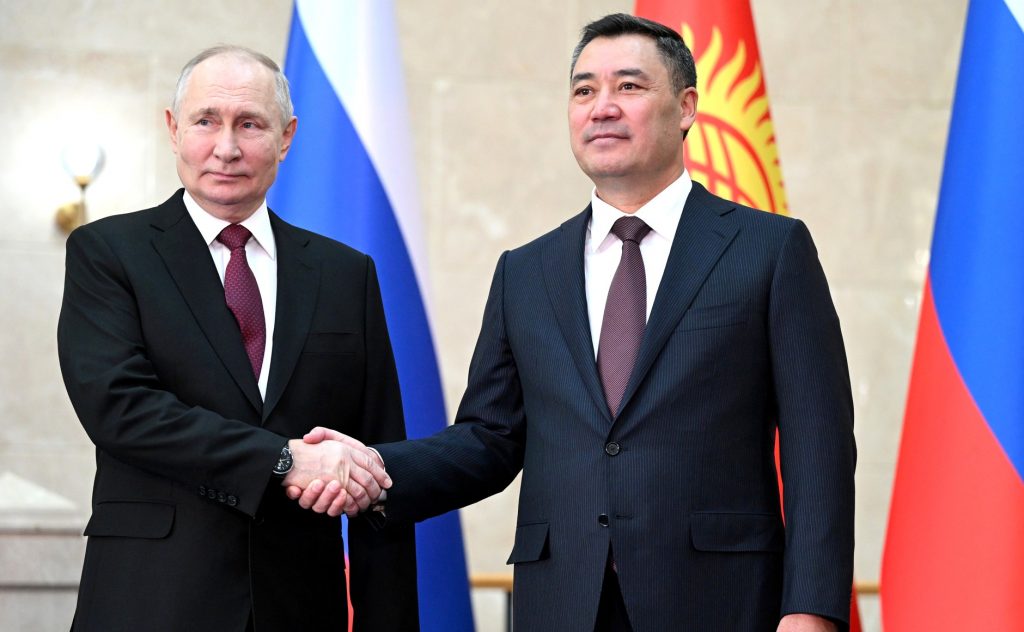
On Thursday, October 12, Vladimir Putin began an official visit to Bishkek (Kyrgyzstan), where his negotiations with President Sadyr Japarov took place at the Ala-Archa residence. The primary purpose of the visit was to participate in a meeting of the Council of Heads of State of the CIS members; however, during the meeting with Japarov, Putin signed several bilateral documents.
Key theses:
- Japarov: “First of all, I would like to note that your visit has a great symbolic meaning since it coincided with the 20th anniversary of the Kant airbase and the 30th anniversary of the Kyrgyz-Russian Slavic University. These significant events in our bilateral relations are symbols of our friendship.”
- Japarov: “It is gratifying that the solid foundation on which we are building our joint future is the historical ties of friendship between the two countries. There is a strong foundation and broad prospects for strengthening the alliance and strategic partnership between Kyrgyzstan and Russia.”
- Putin: “We highly appreciate Kyrgyzstan’s work during its chairmanship of the Commonwealth of Independent States. Russia is taking the baton from Kyrgyzstan: it will chair the CIS in 2024.”
- Putin: “As for economic interaction, Russia is one of Kyrgyzstan’s leading trade and economic partners. Last year, trade turnover increased by 37 per cent – to a record almost three and a half billion dollars. And in the first half of this year, it added another 17.9 per cent.”
- Putin: “Interregional ties are also developing dynamically. More than 80 constituent entities of the Russian Federation actively interact with all seven regions of the republic. The tenth Russian-Kyrgyz interregional conference took place yesterday; I believe it was beneficial. The groundbreaking ceremony for the Friendship Park of the Regions of Russia and Kyrgyzstan also occurred there. These are all significant, very positive things.”
During his visit to Bishkek, Putin also took part in a number of events and meetings:
- Wreath-laying ceremony at the memorial in Bishkek;
- Presentation of the Order of Honour to the President of Kyrgyzstan, Sadyr Japarov;
- Ceremonial event on the occasion of the 20th anniversary of the Russian air base in Kyrgyzstan;
- Meeting with the President of Azerbaijan, Ilham Aliyev;
- Meeting with the President of Tajikistan, Emamoli Rahmon;
- Meeting of the Council of Heads of State – Members of the CIS.
List of documents signed during Putin’s official visit to Kyrgyzstan:
- Agreement between the Government of the Russian Federation and the Cabinet of Ministers of Kyrgyzstan on the conditions of activity of the Kyrgyz-Russian Slavic University named after Boris Yeltsin in Bishkek.
- Agreement on cooperation between the Ministry of Justice of the Russian Federation and the Ministry of Justice of Kyrgyzstan.
- Memorandum of understanding between the Ministry of Natural Resources and Environment of the Russian Federation and the Ministry of Agriculture of Kyrgyzstan in forestry development.
- Memorandum of Understanding between the Ministry of Natural Resources and Ecology of the Russian Federation and the Ministry of Natural Resources, Ecology and Technical Supervision of Kyrgyzstan on cooperation in environmental protection and natural resources.
- Cooperation program between the Ministry of Justice of the Russian Federation and the Ministry of Justice of Kyrgyzstan for 2024–2025.
- Protocol of intent between the Lomonosov Moscow State University and the Ministry of Education and Science of Kyrgyzstan.
- Memorandum of understanding between the Government of the Russian Federation and the Cabinet of Ministers of Kyrgyzstan on issues of ensuring biological safety.
Outcomes and outlook:
Визит в Кыргызстан является знаковым для Владимира Путина: это, по сути, первый зарубежный визит Владимира Путина – после того, как 17 марта 2023 года Международный уголовный суд выдал ордер на арест российского президента. Кыргызстан 8 декабря 1998 года подписал Устав Международного уголовного суда в Гааге, но не ратифицировал его. Именно поэтому Путин не рисковал, когда ехал в Бишкек – действие ордера на Кыргызстан не распространяется.
Путину было важно не только показать, что он – «выездной», но и провести заседание глав государств – членов СНГ накануне поездки в Китай. Ему была необходима согласованная позиция СНГ на переговорах с Си Цзиньпином. Именно поэтому визит в Бишкек был весьма важным и реально достаточно продуктивным.
- Meeting of the Council of Heads of State – Members of the CIS
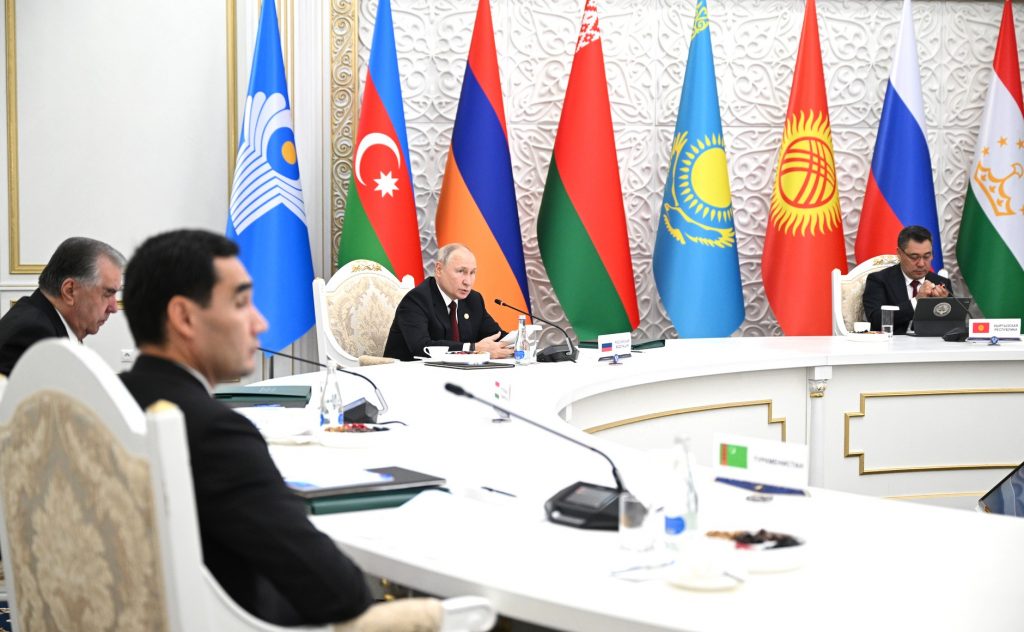
On Friday, October 13, a meeting of the Council of Heads of State of the Commonwealth of Independent States was held in Bishkek. The summit of leaders of the CIS member countries began with a meeting in a narrow format. It was attended by President of Russia Vladimir Putin, President of Azerbaijan Ilham Aliyev, President of Belarus Alexander Lukashenko, President of Kazakhstan Kassym-Jomart Tokayev; President of Kyrgyzstan Sadyr Japarov; President of Tajikistan Emomali Rahmon, President of Turkmenistan Serdar Berdimuhamedov, President of Uzbekistan Shavkat Mirziyoyev and CIS Secretary General Sergei Lebedev. Then, the negotiations continued in an expanded format – with the participation of members of delegations.
Key statements from Putin’s speech at a meeting of the Council of Heads of State – Members of the CIS (held in a narrow format):
- “Yes, this was also mentioned; some countries that previously, perhaps today, are still included in the CIS do not work in this format. But what would you like to say? With Georgia it all started after unsuccessful attempts by the former President of Georgia to solve some internal problems with the help of force and attacks on South Ossetia. This is where it all began – and with the consequences that arose due to this adventure.”
- “Ukraine once signed the fundamental documents on the CIS, but it never joined in full format. Ukraine did not ratify these documents; there was no ratification. Initially, in fact, she avoided full-scale cooperation.”
- “And a country like Moldova practically loses its identity; the elites of this country generally believe that they are not Moldovans; they call themselves Romanians. But this is their choice; the complete loss of the country’s identity is the choice of the current leadership of Moldova. But, I repeat, they want it this way; no one can stop it, except the people of Moldova themselves, if there are people in this country who still consider themselves Moldovans.”
- “This year, GDP growth will be almost nearly three per cent; this is a good result for the Russian economy. I’m not even talking about all the other parameters and indicators, including unemployment, which is at three per cent; it’s nearly non-existent.”
- “But what is very important – and colleagues here also talked about this: the structure of the Russian economy is changing. We have not seen such structural changes for a long time. I have already said that in our growth structure, three per cent remains in the oil and gas sector, and 43 per cent falls on industrial production. What we previously purchased in large quantities abroad is not all; of course, it is impossible to do everything in one blow, but a lot is already beginning to be produced in the Russian Federation.”
- “Last year, as you know, there was a record, historically record [grain] harvest – 158 million tons. It will also be very large this year, already over 130 million tons, somewhere around 134–135 approximately. This means that we still have a huge export potential.”
- “Issues of deepening foreign policy coordination within the CIS remain relevant. Of course, there is a need to regularly compare notes on pressing global and regional issues and develop agreed-upon specific approaches and jointly promote these approaches, including at the UN and other multilateral platforms.”
- “In this context, additional opportunities are opened by the recent expansion of the number of BRICS members and the readiness of this association to work with all partners who share its fundamental values and ideals. Therefore, the Russian side, presiding over the association in 2024, will prioritise establishing cooperation between the CIS and BRICS countries.”
- “First of all, it is necessary to ensure maximum efficiency of cooperation between security forces and other structures in the fight against the financial support of terrorism, laundering of illegal proceeds, organized crime, drug sales and corruption.”
- “Of course, it is important for us to continue joint efforts to preserve the memory of our common history and prevent its falsification. “Young people must know the objective truth about the achievements of our peoples during the Soviet Union, about the heroic exploits of our fathers and grandfathers, first of all, of course, during the Great Patriotic War.”
- “For all of us, I know this; it was wild to see this terrible situation in the Canadian Parliament when everyone stood up together and applauded the former Nazi, a soldier of the SS Galicia division.” It’s just disgusting.”
- “Well, it was absolutely disgusting to watch when the head of the Ukrainian state, a Jew by nationality, applauded not some ideological follower of Nazism but a man who personally exterminated the Jewish population of Ukraine. This is simply disgusting. And I hope nothing like this will ever happen in our countries.”
- “I have already said this; I can just say in general terms that the volume of world GDP in the BRICS countries has already become larger, especially after the expansion of the BRICS, significantly exceeding the G7 countries. And the trend continues – that’s what’s most important.”
- “I have already mentioned Ukraine; this is just one example. In any case, the situation was preparing to reach an acute, “hot” phase for many years. I have already said many times I don’t want to waste time here and waste your time on this, but let me remind you that the Ukrainian crisis began in 2014 when a coup was organised. Then a war was unleashed, fighting in the south-east of Ukraine. This is where it all started.”
Putin’s speech at the meeting of the Council of Heads of State of the CIS (extended format):
- “Let me emphasise: Russia is determined to actively work to further strengthen the authority of the CIS as an integration association and develop comprehensive cooperation within the Commonwealth on the principles of mutual understanding, trust, equality and good neighbourliness.”
- “We plan to prioritise deepening economic integration, including interaction in the areas of digitalization – we talked a lot today, and our chairman spoke about this separately – energy, industrial and agricultural cooperation, transport and communications, ecology and innovation.”
- “Considering that Russia will preside over BRICS in 2024, which has expanded and within which criteria and principles of cooperation with partner states are currently being developed, we will pursue a policy of strengthening interaction between the CIS member states and this association.”
- “In the military and law enforcement spheres, the Russian chairmanship will focus on improving mechanisms for jointly countering both new and traditional challenges and strengthening the external borders of the Commonwealth. We will do everything necessary to fully implement relevant CIS programs, including the Concept of Military Cooperation and the Program for Strengthening Border Security.”
Outcomes and outlook:
Putin is seeking three things:
- Greater monolithicity of the CIS as an organisation.
- The consolidated position of the CIS in the external direction (especially in negotiations with China, which has a history of relations with most of the CIS member states).
- Filling the CIS with new content (especially because the initial objectives that guided the states when signing the CIS agreement have long ceased to be relevant).
Today, the CIS has become a formalised forum for the heads of several post-Soviet states. Without new meanings, this format will very soon degrade, giving way to new, more efficient and technological unions of states.
- Mikhail Fridman’s return to Russia
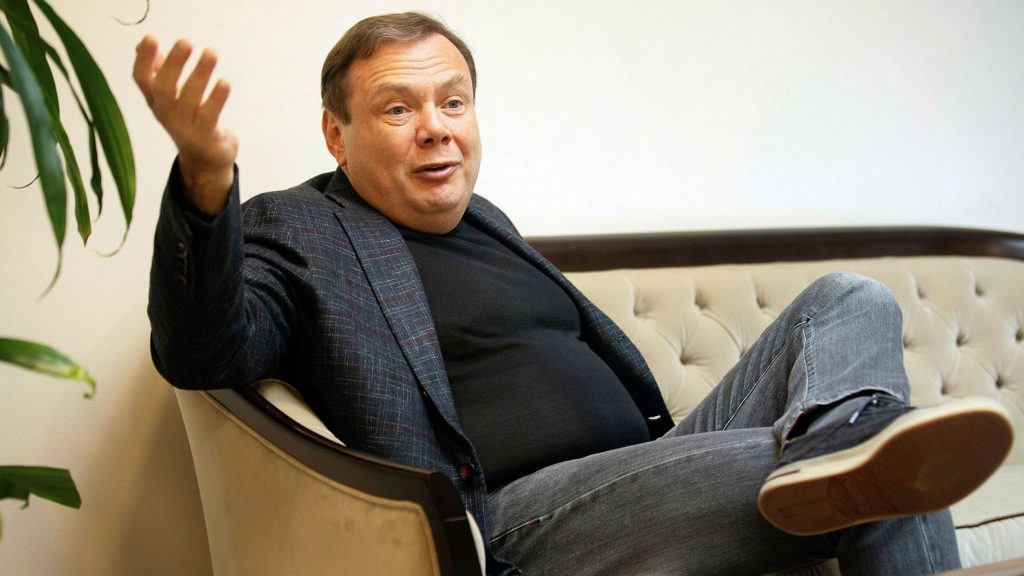
On Monday, October 9, it became known that Russian oligarch and owner of Alfa Group Mikhail Fridman returned to Russia, where he plans to spend most of his time. It is known that after the start of Russia’s full-scale invasion of Ukraine, Friedman went to the UK, where he lived for almost two years. However, in mid-September, Great Britain tightened sanctions against the oligarch, including transport restrictions that made it possible to seize Friedman’s ships, planes, cars and other vehicles.
After tightening sanctions, being a citizen of Russia and Israel, Friedman decided to move to Israel. However, after escalating the situation between Hamas and Israel, Friedman decided to move back to Russia, which the oligarch himself spoke about in a commentary for Bloomberg.
Outcomes and outlook:
Friedman’s return was dictated by the problems that the billionaire had abroad and by the success of lobbying by individuals with influence on President Putin (Oleg Deripaska, Roman Abramovich). Friedman was indeed incorporated into the environment of the American and British elites, but at the same time, he could not completely become “one of his own.” His return is a signal to other business elites: “The West is not waiting for you,” “If Friedman didn’t agree, then you can’t either.” Friedman is the face of a huge corporation that was closely tied to the money of the Russian intelligence services and the old party elite. His return to Russia was only a matter of time and receiving guarantees from Putin.
- Visit of Nikolai Patrushev to Azerbaijan;
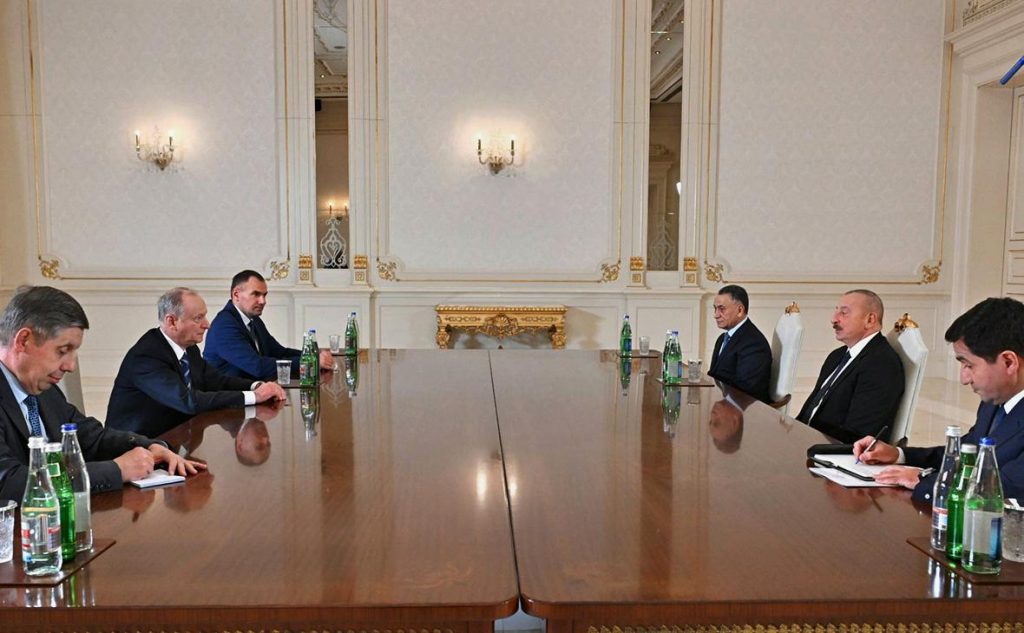
On Tuesday, October 10, the Secretary of the Security Council of the Russian Federation, Nikolai Patrushev, visited Baku (Azerbaijan). During the visit, Patrushev held a meeting with Azerbaijani President Ilham Aliyev. According to official statements, the parties discussed a wide range of issues of Russian-Azerbaijani cooperation in various areas. There was also an emphasis on ensuring and strengthening regional and international security and stability.
Patrushev also held a working meeting with the Secretary of the Security Council of Azerbaijan, Ramil Usubov. The main topic of the meeting was a discussion of strengthening interaction between law enforcement agencies and intelligence services of the two countries. In addition, Patrushev and Usubov summed up the results of the Russian-Azerbaijani security consultations that took place on the same day with the participation of representatives of the security council apparatuses, ministries and departments of the two countries.
Outcomes and outlook:
Azerbaijan is turning into another partner of Russia in the Caucasus and the Caspian Sea. Building a system of relations with Azerbaijan means further rapprochement with Turkey (Azerbaijan’s main ally in the region), its own game in the Middle East (of which Azerbaijan is a part), and the possibility of building unique political relations with Iran (which has some tension in relations with Azerbaijan – at least Russia believes that it can become the force that will resolve the contradictions).
At the same time, any contact between Moscow and Baku led to a nervous perception of the very fact in Yerevan. Russia is making it clear in every possible way that it is not an enemy of Armenia but will not tolerate Nikol Pashinyan. In this way, anti-Pashinyan sentiments are artificially fueled. Patrushev’s visit to Baku is the first after the latest aggravation of the Karabakh issue. Most likely, we can expect a favourable decision on the case of the release from the arrest of the former prime minister of Nagorno-Karabakh, Ruben Vardanyan, in which Russia is interested (Vardanyan was a consistently pro-Russian politician). This could significantly strengthen Russia’s authority in Armenia (which has been substantially shaken by recent events, and many Armenians consider Putin a traitor).
- Interview with Deputy Secretary of the Security Council of the Russian Federation Oleg Khramov to Rossiyskaya Gazeta
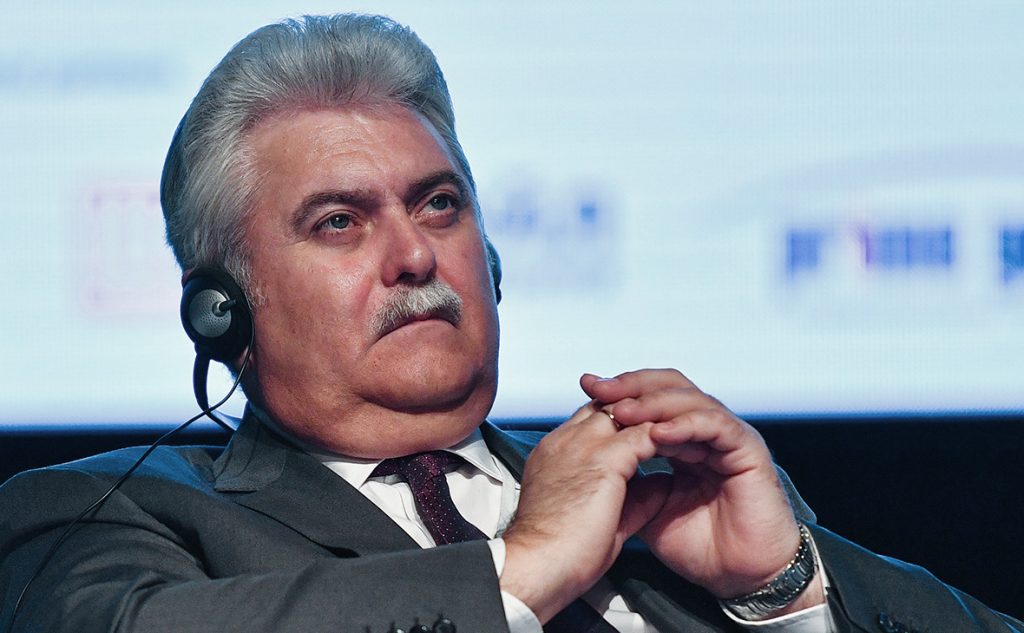
On Wednesday, October 11, Rossiyskaya Gazeta published an interview with Deputy Secretary of the Security Council Oleg Khromov, in which he expressed his opinion on global cybersecurity and other similar threats to Russia and the world.
Key theses:
- “The US desire to inflict a strategic defeat on Russia increases the likelihood of a cyber conflict. American regulatory and conceptual documents are clear proof of this.”
- “Cyber strike capability was included in Washington’s 2023 National Defense Authorization Act. It is characteristic that in comparison with 2021 and 2022, US cybersecurity spending has increased significantly.”
- “The lack of effectiveness of the Ukrainian armed forces may push hotheads to use American offensive cyber weapons to damage the state and military administration and the economic system of Russia.”
- “With the involvement of the IT army of Ukraine, the West developed and simultaneously tested a model for creating and managing a group of “volunteer hackers” to carry out computer attacks on Russian information resources. Under the cover of total Russophobia, “Ukrainian” attacks on Russian critical information infrastructure facilities are not only not condemned, but even encouraged.”
- “Western policy-making circles, relying on the special services, have deployed an extensive network of foreign lobbying and PR agencies. They are called upon to create reasons for carrying out global information campaigns in their own interests.”
- “The current state of international relations is characterised by a global confrontation between Western countries not only with Russia but also with other countries that defend their national interests.”
- “The United States, having created the Internet, ensured the localisation of control of most of it on its territory, and as it became global in nature, they began to use their dominance to solve their opportunistic problems, including in the interests of American law enforcement agencies.”
- “In a desperate struggle to maintain political and technological dominance, Washington is trying in all possible ways and means to isolate the information space from countries it does not like, changing along the way its own previously imposed approaches. Such actions by the Americans have led to the desire of sovereign states to isolate national segments of the Internet, which leads to its fragmentation.”
- “The attitude of the Americans is obvious: unable to operate with technically reliable data about the sources of cyber attacks, Washington and its allies make unsubstantiated accusations against states they do not like.”
- “Interesting metaphor. The so-called equal partnership proposed by Washington has a “double bottom” since the conditions created as a result for the United States to control the information infrastructure of other states simplify the implementation of American scenarios of “colour” revolutions in various parts of the globe and the overthrow of unwanted governments.”
Outcomes and outlook:
Khramov is the person who oversees issues related to the field of information technology and cyberspace security in the Security Council of the Russian Federation. However, Khramov’s interview is, first of all, a signal to the West regarding Russia’s readiness to respond to challenges and attacks and take appropriate actions in relation to the West. This is, in fact, a list of threats and blackmail from Russia: they say that an escalation of the confrontation will certainly lead to increased information cyber attacks on Western targets, and Russia is as ready as possible to transfer the war to this plane.
- Vladimir Putin’s interview to the Chinese media corporation
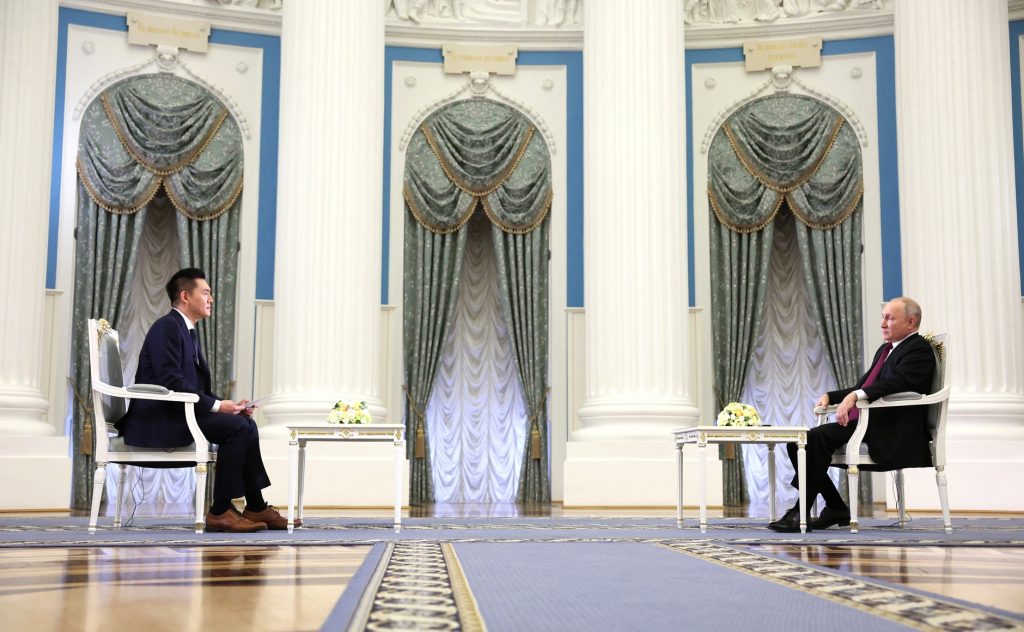
On the night of October 16, a new interview by Vladimir Putin with a Chinese media corporation was published online. It is important to note that it appeared on the eve of the Russian president’s visit to China to participate in the “One Belt, One Road” forum. Notably, this is Putin’s first interview with Chinese media in the last two years.
Key theses:
- “I only started skating ten years ago. Before that, not only did I not know how to skate, I didn’t know how to stand on them. But ten years ago, I tried it, started and am still playing. Why before? I still play now. Now, I do this with pleasure. Team sports are always interesting, emotional, exciting, and truly provide an opportunity to take a break from current affairs.”
- “Relations between Russia and China – you know, now I’m telling you what comes to my mind right now after you formulated the question – they did not develop under the current conjuncture of world affairs, this is not the result of a momentary political conjuncture in the world – Russian-Chinese relations.”
- “Gradually, China became Russia’s first trading partner in terms of trade turnover, and Russia gradually rose to sixth place among Chinese trade and economic partners.”
- “I’m not even talking about the role that Russian-Chinese relations play in the matter of stability in the world. Russian-Chinese relations are a fundamental factor.”
- “Over the previous period, our trade turnover grew by 32 per cent – this is excellent growth. There is every reason to believe that we will reach the 200 billion mark at the end of the year.”
- “You know, if we talk about the UN sustainable development goals, there are more than one, two or three of them; in my opinion, there are 17. The fight for the environment and the fight against climate change are very important areas, but not the only ones. We must not forget about such goals as the fight against poverty, for example. How can you tell people in African countries they will not receive oil and petroleum products? You will have to focus exclusively on renewable energy sources – wind power, say, the sun, etc. They are largely inaccessible to developing economies. So what, people suffer from hunger, or what? Everything must be balanced; all decisions must be balanced.”
- “Today, one way or another, do you know how many are taking part in implementing the ideas of Chairman Xi Jinping? One hundred forty-seven countries, two-thirds of the world’s population. Therefore, I believe this is already a success; this is a good, correct and technologically advanced developing initiative.”
- “I have already said that the countries of the Eurasian Economic Union, the Eurasian Economic Union, have already provided $24 billion of investments in the course of joint work within the framework of the One Belt, One Road initiative. But this volume is growing because the number of mutually beneficial projects is increasing.”
- “We have joint projects. It may be too early to talk about this. Still, I am sure that contracts will be signed, new contacts will be established between participants in economic activity, and government leaders and heads of various ministries and departments that work directly will meet.”
- “You know, it seems to me that the main advantage of the concept of interaction proposed by the Chinese side is that within the framework of this work, no one is imposing anything on anyone. All this is part of the search not only for acceptable solutions but for projects and ways to achieve a common goal that is acceptable to everyone.”
- “Everyone knows, it’s no secret: I come from a simple working-class family, and at one time, I had a lot of time to spend time in the yard. It’s unknown what my fate would have been like if I hadn’t become interested in sports; it doesn’t matter what kind; it must be sports, and I paid a lot of attention to it.”
- “You just said “rules-based order.” Have you ever seen these rules? No, because no one has ever written them, and no one has ever agreed with anyone. How can we talk about order based on no one has seen rules? From the point of view of common sense, this is nonsense; this is some kind of nonsense. But it is beneficial for those who promote this approach.”
- “It’s not surprising that today’s political elite, say, in the United States, talks about its exclusivity. This is a continuation of this colonial thinking.”
- “Our approach is completely different. We proceed from the fact that all people are equal, everyone has the same rights, the rights and freedoms of one country and one people end where the rights and freedoms of another person or an entire state appear. This is how a multipolar world should gradually be born.”
- “President Xi Jinping calls me his friend, and I call him my friend. Our people say: tell me who your friend is, and I will tell you who you are – there is such a saying.”
- “Nevertheless, I want to remind you that hostilities began in Ukraine not with our [so-called] “special military operation”, but much earlier – in 2014, when Western countries, having acted as guarantors of the agreements between President Yanukovych and the opposition, forgot about their guarantees a couple of days later and contributed to the coup d’etat. And officials of the US Administration directly stated that they spent a lot of money on this, in my opinion, they said five billion, and now it should be the way it happened.”
- “Let me remind you that when Ukraine received its independence or declared its independence, the Declaration of Independence formed the basis of independent Ukraine. The main thesis of this Declaration of Independence is that Ukraine is a neutral state.”
- “Therefore, if the Ukrainian side wants this [negotiations], we need to start by cancelling this decree and announcing our readiness for these negotiations. We are ready, including using the proposals of our Chinese friends.”
Outcomes and outlook:
Interviews of the leaders of China and Russia with the leading media of the two countries have long become a tradition: one may recall that on the eve of Xi Jinping’s March visit to Moscow, Putin published a large article in the Chinese media, and Xi gave an interview in Rossiyskaya Gazeta. This is part of the established protocol. However, in his current interview, Putin focuses not only on Chinese-Russian relations but also clarifies that left-wing ideas are not alien to him. He draws attention to several problematic issues (including those regarding Ukraine) and presents them in the interpretation in which he would like to find support from China. In particular, it is felt that in matters of the war in Ukraine, Putin would like to count on the mediation of Xi Jinping, who is meeting with Joe Biden in San Francisco in early November.

